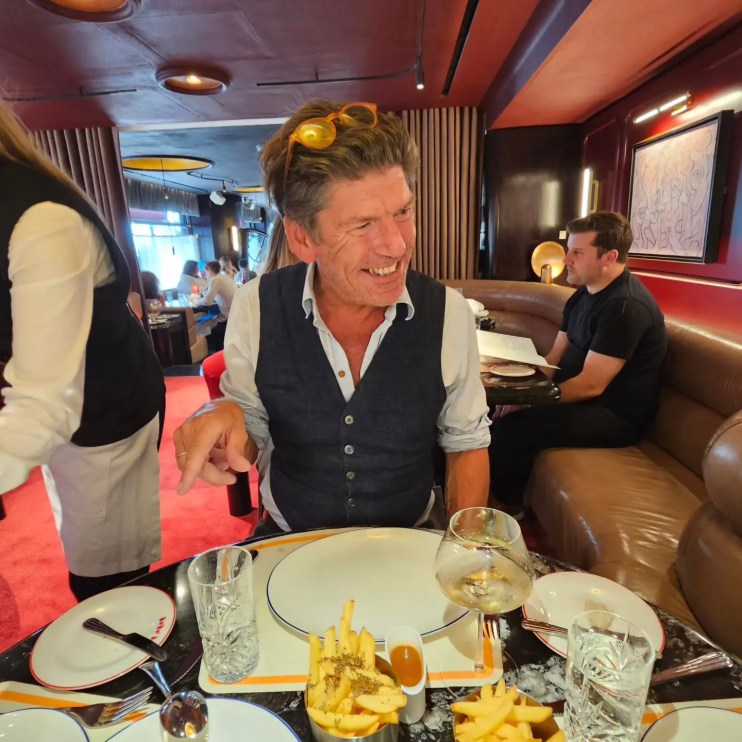My friend, Russell Norman, the London restaurateur who changed the capital

Russell Norman, who died last week, is credited with changing London’s restaurant scene over the past decade and more. His friend Richard Vines writes on the man and his legacy.
Russell Norman was one of the most creative and influential U.K. restaurateurs London has known: He could see the big picture and the tiniest detail at the same time.
He changed the London dining scene in 2009 with Polpo, a Venetian bacaro in Soho. Other successful restaurants followed, but he surprised many of us when he achieved a second breakthrough more than a decade later with Brutto, an informal Florentine restaurant on a site in Clerkenwell that appeared almost doomed.
(The chef Mark Hix was among those who had tried his hand there, and I advised Russell, whom I was proud to call a friend, that it would never work. Oh well.)
Russell was a raconteur with countless ideas. Most were his own but others he picked up on his travels, especially to New York and to his beloved Italian cities of Venice and Florence. While he was driven by self-doubt as well as by inspiration, inspiration triumphed.
He was hard-working, charming and kind, with a great love for his family, and was generous in his charity work.
He first came to public attention with Polpo. Anyone who wasn’t there might have difficulty understanding just how hot Polpo was in those early days. People queued for as long as it took to get a cramped table in a stuffy room because dinner was no-reservations.
That room was Russell. Every detail was thought through, from the paper on which the menu was printed and the typeface used, through to the (revolutionary at the time) filament light bulbs to the metal-panel ceiling. It was Russell from the bare-brick walls through the plates to the tattooed staff: he prided himself on recruiting staff based on look and attitude, rather than on training and experience.
Polpo lost its way when it became a chain but its legacy lives on, not just in the remaining two sites (owned by Russell’s business partner, Richard Beatty) but in its popularizing of cicchetti (Venetian snacks) and Negronis and even those light bulbs, which you can now spot around the country.
Russell didn’t appear from nowhere. After studying with his friend Beatty at Sunderland Polytechnic, he joined the London restaurant scene as a waiter at Joe Allen, learning the business from the bottom up. He rose to manage Circus and Zuma before becoming operations director at Caprice Holdings.
I first became friends with Russell after meeting him at Polpo in 2009. I have happy memories of time I spent with him and Beatty in New York, as well as of trips with Pierre and Claire Koffmann to Noma in Copenhagen and to El Celler de Can Roca in Girona, Spain. (After a multi-course gourmet meal at Noma, Russell and I snuck out to a nightclub and ended the evening with a pizza at 7-Eleven.)
But mostly, Russell and I hung out in London, extending long lunches into the evening. Whether it was drinking Champagne in the garden at Chiltern Firehouse or on the terrace at Sushisamba, he was always great company. (I’d bail out before he went on to the Groucho Club. He was a sprightly 57.)
It wasn’t just his stories of celebrities and other life forms, but his range of interests. He might be talking of Chris Martin or of a favourite philosopher, only to break off when he spotted a detail that bothered him in a restaurant. Fortunately, his favourite places knew only to serve him Champagne in a wine glass, never a flute.
He was stylish and fun, the Bryan Ferry of the restaurant world. Always well-dressed, whether in a suit or a T-shirt and shorts, and sporting a great haircut, he was someone to whom men and women were both drawn. He was so cool, you’d feel proud to be with him. He had a youthful energy, even though his lined face showed the stress behind effortless success. It’s the face that launched a thousand small plates.
He’s still with us at Brutto and in his fine cookbooks. And filament lightbulbs.
Russell Norman is survived by his three children and his former wife Jules, and by his partner Genevieve Verdigel.
Richard Vines retired in 2021 after 26 years at Bloomberg, where he was Chief Food Critic.
